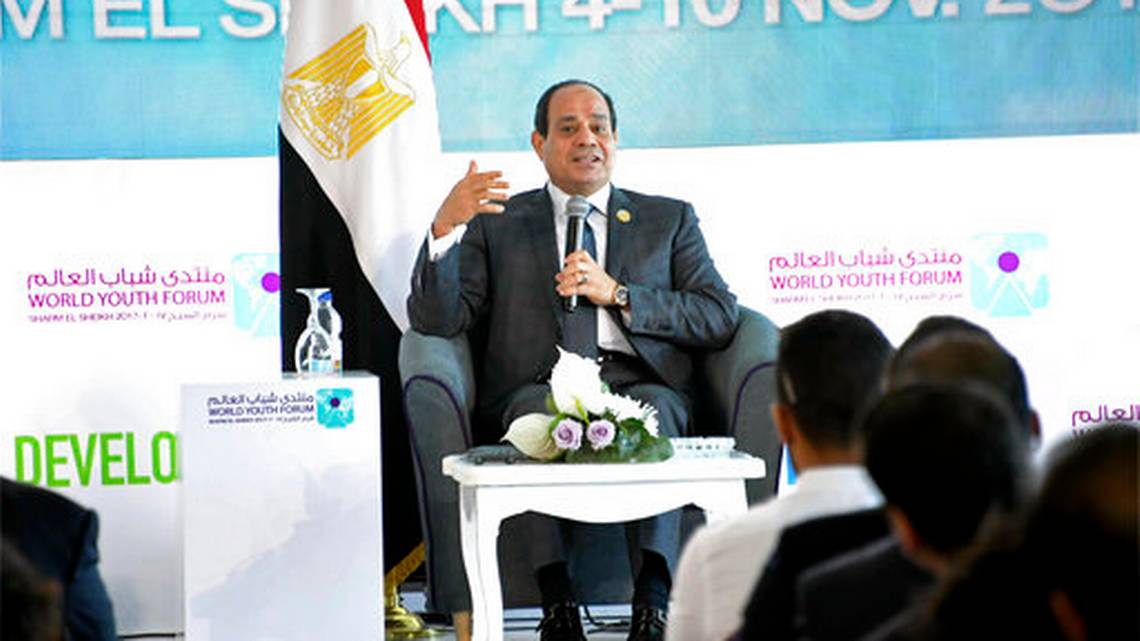Egypt fears influx of militants after Islamic State defeat

Egyptian President Abdel-Fattah el-Sissi says Islamic State militants are making their way to his country via Libya after the defeat of the extremist group in Syria and Iraq.
Egypt has been battling a powerful IS affiliate in its northeastern Sinai Peninsula for the last three years, and has recently seen an uptick in attacks in its vast western desert region, which borders chaotic Libya.
El-Sissi said a "strategic imbalance" caused by the regional turmoil had forced Egypt to build up its military in recent years. The country has spent more than $10 billion since 2014 on a wide array of weaponry, including French-made Rafale fighter jets and helicopter carriers, MiG-29 fighter jets and assault helicopters from Russia, and submarines from Germany.
The shopping spree comes at a time when Egypt's economy is struggling to recover from years of unrest since the 2011 uprising. Egypt secured a $12 billion loan from the International Monetary Fund last year to bolster reform efforts, and it receives some $1.3 billion a year in U.S. military aid.
Speaking at a news conference at the Red Sea resort of Sharm el-Sheikh late Wednesday, el-Sissi said it was only "natural" that IS militants would flee to Libya, which has been mired in chaos since its own 2011 uprising.
"We must have the military capabilities that compensate for that imbalance in the region and to counter terrorism," he said. "This is a threat not just faced by us, but also by Europe."
Libya is split between two governments, each backed by an array of militias. Egypt supports Field Marshal Khalifa Hifter, a military leader in the east who is at odds with U.N.-backed authorities in Tripoli. Forces allied to the U.N.-backed government drove IS from its main Libyan stronghold last year.
Egypt has long sought to portray terrorism as a threat originating outside its borders, but experts say the insurgency in Sinai is rooted in longstanding local grievances. New militant groups have emerged elsewhere in Egypt in the wake of the 2013 military overthrow of an elected but divisive Islamist president, which was led by el-Sissi.
Last month, militants attacked Egyptian security forces west of Cairo in what appeared to be an elaborate ambush. The Interior Ministry said 16 police officers were killed, but security officials said the toll exceeded 50.
El-Sissi said subsequent operations by security forces have killed the 14 militants he said participated in the attack. He said a "foreign" militant was captured alive, and that up to 20 vehicles loaded with fighters and weapons were destroyed over the past week in the western desert.
He suggested the militants may have been plotting to attack a Coptic Christian desert monastery. Authorities blamed a spate of attacks earlier this year that killed more than 100 Christians on militants based in Libya.
El-Sissi also used the news conference to deliver a stern warning to Ethiopia, which is finalizing construction of Africa's largest hydroelectric dam, on the Nile's main tributary, and will eventually start filling a giant reservoir. Egypt, with a population of 95 million, fears a significant reduction in its share of the Nile, on which it depends for most of its water needs.
Ethiopia says the dam is essential to its development and has repeatedly sought to reassure Egypt. But Cairo's efforts to persuade Addis Ababa to engage in closer coordination over the dam appear to have made little headway.
"We positively view the developmental needs of our friends and brothers in Ethiopia," el-Sissi said. "Water to us is not merely a question of development, it's a matter of life and death. We are capable of protecting our national security and water to us is a question of national security. Full stop."
The Egyptian leader did not say what Egypt intended to do. The government has publicly ruled out military action, but top Egyptian officials have in recent months been sharpening their rhetoric on Ethiopia.
El-Sissi has sought to foster better ties with Sub-Saharan Africa, especially fellow Nile basin countries, insisting that while his country needs its full share of the river's waters, it is ready to help them with economic development.